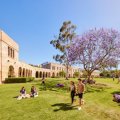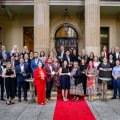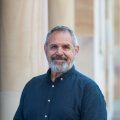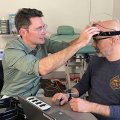The founder of deaf-mute participatory theatre initiative from the Democratic Republic of Congo, and a Ugandan organisation preventing violence against children in sub-Saharan Africa have been announced as the 2011 Communication for Social Change Award winners.
The awards are administered by The University of Queensland’s Centre for Communication for Social Change (CfCSC) at the School of Journalism and Communication.
The Award is the only one of its kind in the world.
It recognises individuals and organisations that have demonstrated extraordinary commitment to using communication to transform and empower marginalised communities.
The Award Secretary is UQ's Associate Professor Pradip Thomas.
“Individual winner Freddy Mata Matundu and Raising Voices, the organisation category winner, have enabled transformational change in some of the most marginalised and vulnerable communities through innovative communication processes and media,” he said.
Freddy Mata Matundu said that deaf and mute people in the Democratic Republic of Congo (DRC) were "marginalised and invisible".
"They suffer discrimination in a society where belief in witchcraft is very strong, and being deaf and mute is associated with sorcery," he said.
"Even if their family does not abandon them, they still suffer from a lack of opportunity, especially in terms of access to education and employment.
“Using a very popular communication tool in DRC - theatre - we hope to break down the barriers and create understanding between the 'hearing' and the 'deaf-mute'.”
Co-director of Raising Voices Dipak Naker said: “Violence against children is a pervasive problem in Uganda, as in many countries in the world.
"A majority of children experience violence on a regular basis from adults they know in their communities, schools or at home.
"In response, Raising Voices launched a specific program, marrying research and activities, to prevent violence against children.
“We feel deeply honoured that our work was selected for this award.
"Given the global scope of the award and the number of entries that the judges must have considered, we felt humbled by this recognition and inspired to continue innovating.”
Winners will receive their Award from The University of Queensland Vice Chancellor, Paul Greenfield, AO, at a ceremony on Wednesday 19th October.
Special guests at a symposium related to the Award ceremony include:
• Simon Sheikh, director of independent, grass-roots community advocacy organisation GetUp!
• Margaret Reynolds, former Minister for Local Government Regional Development and disability advocate,
• Representatives from Amnesty International Australia and Reconciliation Australia.
The Award consists of a $AUD 2500 prize and a travel package to promote the impact that communication projects can have in development efforts.
Both Award winners will visit AusAID while in Australia to showcase their projects.
This year 65 nominations were received from 27 countries, including Afghanistan, Bangladesh, Beirut, Jordan, Moldova, Nepal, Peru, Portugal, Rwanda and Venezuela.
This was almost a four-fold increase on the previous year.
An independent jury, including UQ Professor of Public Administration Ken Wiltshire AO, Annmaree O'Keefe of the Lowy Institute, Peter Cave of ABC, and Fiona Crockford, Assistant Director of Citizen Engagement and Political Analysis at AusAID, chose the 2011 Award winners.
For further information please contact Siena Perry at Siena.perry@uq.edu.au, or on (+61 7) 3346 3092
About the Winners
Individual Award Winner- Freddy Mata Matundu
Democratic Republic of Congo (DRC)
Freddy Mata Matundu is the founder and coordinator of an innovative, community based initiative that uses participatory theatre and film to create acceptance of deaf, mute and hearing impaired people, and promote peer-to-peer learning within these communities. There are an estimated 1.4 million deaf, mute and hearing impaired people in the DRC. These people are marginalised, face discrimination, and suffer from a lack of educational and employment opportunities.
CPPSS uses participatory performance to combat misunderstanding between the “hearing” and “deaf-mute” worlds. CPPS also empowers deaf, mute and hearing impaired communities through peer-to-peer awareness campaigns on health and sexual and gender based violence issues, and by using civil education to explain the electoral process and encourage deaf-mute voter participation in elections.
Organisation Award Winner- Raising Voices
Uganda
Raising Voices is based in Uganda and works to prevent violence against women and children in sub-Saharan Africa. It works to create practical methodologies that enable communities to take action. One example of such an approach is their work on prevention of violence against children (VAC). Raising Voices conducted research with a broad range of children and adults about their conception and experience of VAC and subsequently created a national dialogue on the issue through a multimedia campaign, school based work, and national level activism on prevention of VAC. Their multi- media campaign reaches more than 2 million individuals a week through newspapers, radio, television, community events and films. The organisation is recognised regionally and internationally as a pioneer in developing innovative approaches for preventing violence against women and children.
A 15-minute advocacy film about violence against children in Uganda can be viewed by going to this website http://www.raisingvoices.org/children/communication_materials_films.php
.jpg)









